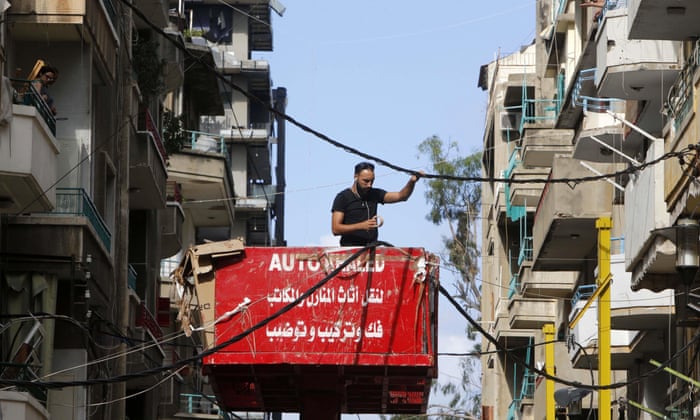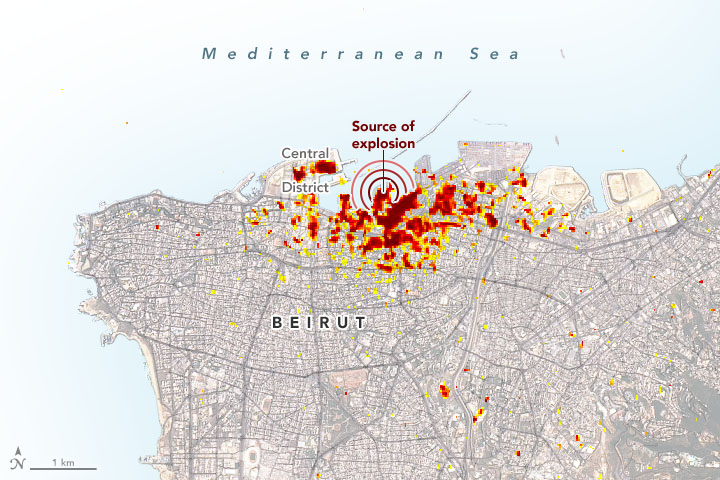Lebanon on Life Support
Lebanon on Life Support
“The country is experiencing the aftermath of a huge disaster that has left a devastating impact. The port of Beirut disaster resulted from deep-seated corruption and years long mismanagement. I am ready to handle the government’s responsibility for two months until political parties reach an agreement." "Lebanon cannot rise from the current crisis without early parliamentary elections. The investigation of the Beirut port tragedy will not take long." Lebanese Prime Minister Hassan Diab,
"I took to the streets yesterday because I have nothing left to keep me home. I could have died in the explosion, which is a result of the government’s corruption over 30 years." "We — the people in the streets — have so much rage inside us, something I have never witnessed before. People have died because of the government’s slackening and failure to play its role after the blast." "We are protesting to ask the government to step down. I think we achieved something yesterday. We broke the taboo by hanging gallows in the square. We are back to tell the ruling class that we have not forgotten about it." Fatat Ayad, a protester
"[Saturday's] protest outweighed the Oct. 17 one because of protesters’ simmering, unprecedented rage since the October revolution." "The main drive of yesterday’s protest was people’s deep sense of the government’s disdain for its people." "I don’t think anything will appease the streets before taking their revenge. New, well-studied, violent and organized protests are being arranged. Many revolution groups called on people to remain in the streets. Daytime hours will have precarious calm because most of the youths work in the relief efforts, but various acts can be expected any minute." Ali Heidar, political activist
 |
| The huge quantity of ammonium nitrate should have been immediately moved out of the busy port after it arrived. |
 |
| This composite image shows the port of Beirut before and after Tuesday's blast. (Mohamed Azakir/Reuters) |
| Demonstrators stand near a burning fire during a protest near parliament following Tuesday's blast in Beirut's port area. (Mohamed Azakir/Reuters) |
"These resignations show the fragility of the regime at the current stage and how difficult it is to reproduce itself — after Oct. 17 and after the monetary collapse, and the economic crisis and the explosion of the port," " These resignations are details. What is important are the popular movements, their organization and resistance. The wager today is that we will be able to advance and take actual steps to change the entire system." Hashem Adnan, a political activist in political and social change movement LiHaqqi Group
 |
| People make their way toward a clash
happening between two separate factions of protesters during a protest
at Martyrs' Square, Beirut, Lebanon, Aug. 9, 2020. Photo by Daniel
Carde/Getty Images Tear
gas was fired at protesters on Sunday in Beirut in an effort to
disperse the rock-throwing protesters furious with their incompetent,
corrupt government when a road was blocked near parliament in a second
straight day of anti-government demonstrations in response to the
devastating explosion last week in Beirut's dock area killing 160 people
and injuring 6,000. At an entrance to Parliament Square fire broke out
while demonstrators attempted to break through a cordoned-off area.
Protesters were able to break into the ministry offices of the housing
and transport minister. And
amidst the accusations of incompetence and malfeasance, the fury and
the blame, two government ministers resigned, agreeing that the
government had indeed failed to reform. The explosion last Tuesday of
over 2,000 tonnes of ammonium nitrate focused peoples minds on the
plight of the country in economic crisis caught in the grip of a
menacing pathogen, massive unemployment and no end in sight of the
misery people are facing, not a shred of light at the end of the tunnel
of suffering and privation. The
further devastation caused by the detonation of carelessly stored
explosive material when the government had turned deaf ears to imploring
dock authorities anxious to have the chemicals removed, mindful of the
danger it presented, was simply too much for Beirutis to bear. The
government's move to disqualify itself from responsibility for the
explosive event that devastated the nation's granary when the dockside
silo carrying 80 percent of the nation's stored wheat blew to
smithereens, made it no allies. That the government chose to arrest 16
people responsible for dock management represent a further prod to fury.
Sunday protests continued to demand the departure of the government.
Environment Minister Damianos Kattar and Information Minister Manal
Abdel Samad rendered their resignations, a move that failed to placate
the incandescent rage of protesters. 238 people were wounded during the
protests, 63 transferred to area hospitals. Treatment elsewhere was
given the remaining 175 wounded. A member of the Internal Security
Forces was killed during the clashes between protesters and security
personnel. |
 |
| Damaged buildings in Beirut, Lebanon, on 10 August after a massive chemical blast at the port last week. Photograph: APAImages/Rex/Shutterstock |
Carrying
batons, riot police in body armour clashed with demonstrators,
thousands of whom had converted on Parliament Square and Martyrs' Square
nearby. "We
gave these leaders so many chances to help us and they always failed.
We want them all out, especially Hezbollah, because it's a militia and
just intimidates people with its weapons", unemployed
demonstrator Walid Jamal said. Hezbollah is not merely a militia, a
protegee of the al-Quds force of the Islamic Revolutionary Guard Corps,
it is Lebanon's unofficial military, acting independently with separate
munitions depots, to the nation's military.
The
weekend's protests were scenes of violence in central Beirut,
representing the largest protests to take place since October when back
then thousands demanded an end to corruption, mismanagement and bad
government. "The
resignation of an MP or a minister is not enough ... the whole
government should resign as it is unable to help the country recover", said Christian Maronite cleric Patriarch Bechara Boutros al-Rai; the cabinet must resign having proven it cannot "change the way it governs".
Martyrs'
Square had been transformed into a battle zone between police and
protesters trying to break down a barrier with some demonstrators
storming government ministries and the Association of Lebanese Banks.
The very same banks refusing to release cash funds to people who bank
with them. "The police fired at me. But that won't stop us from demonstrating until we change the government from top to bottom", retired army officer Younis Playti,55, declared on Sunday. "Every leader who oppresses us should be hanged", charged mechanic Sabir Jamali, sitting beside a noose attached to a wood frame.
The
government responded by reiterating its determination to hold those
responsible for the blast to account. They certainly don't mean
themselves. Nor do they mean Hezbollah and its chief Nasrallah whose
storage of munitions zealously collected in Hezbollah depots over the
years, planning with Iran in preparation of a massive launch to be
executed against Israel, would have been the likeliest target of 'those
responsible'. Instead, public attention is meant to be deflected by
arresting port authorities. For of course Hezbollah is an integral part
of Lebanon's government....
 |
| The image above is a damage proxy map created by scientists affiliated with NASA’s Advanced Rapid Imaging and Analysis (ARIA) team and the Earth Observatory of Singapore (EOS). Dark red pixels represent the most severe damage, while orange and yellow areas are moderately or partially damaged. Each colored pixel represents an area of 30 square meters (about the size of a baseball diamond). |
Labels: Lebanon
posted by Pieface @ Tuesday, August 11, 2020
![]()
![]()

<< Home